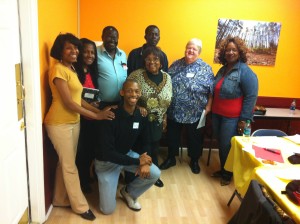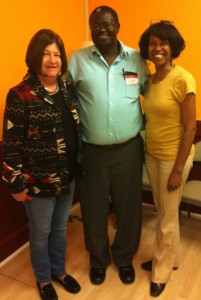Storytelling 101: Listening With a Juicy Face
“Grandmother, what big eyes you have!”
“All the better to see with, my child.”
“Grandmother, what big teeth you have!”
“All the better to eat you up with, my child.”
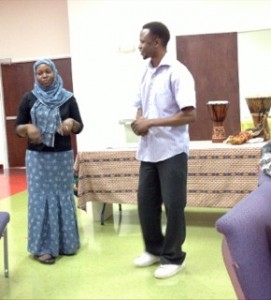
Sound familiar? Of course it does. It is the story we all know as “Little Red Riding Hood” or in Sudan what is known as “Mr. Hyena”. As members of USASSCA & Kuumba Storytellers of Georgia all listened with eagerness and anticipation, also known as a listening with a “juicy face”, this classic tale unfolded right before our eyes. Attendees of the Storytelling 101 Workshop did not know that we were in for a treat; a tandem telling by Hiram & Basmat of USASSCA. As Hiram told in Fur, one of the many languages spoken by the Sudanese, Basmat translated to English.
And as with stories that travel, there were many similarities and differences. Similarities included a young child taking a treat (eggs) to go see the sick grandmother and encountering a dangerous animal (hyena) alongside the road. The hyena later kills, and then poses as the grandmother. However, the story’s ending is somewhat different. In the Sudanese version, when the hyena is asked why his mouth is so big he replies, “So that I can eat the eggs and you because your granny was not tasty”. At this point of the story, the girl’s father comes into the grandmother’s house with a knife and threatens to kill the hyena. The hyena gets scared and jumps out of the window.
USASSCA member Abrahim also shared one of the children’s stories he had collected. He read it in Dinka, another language spoken by the Sudanese. It is a story about two friends who go to a distant land to face wolves and get cattle. The two have a disagreement and must face a wise judge who settles their dispute.
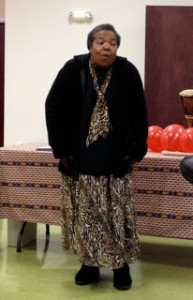
And speaking of disputes, certainly frogs and snakes are no strangers to the word. At least that is what one would gather from the story Esther Culver used to illustrate her presentation on story modeling. The participants praised her for successfully bringing the characters to life. Through her voice changes, hand motions, and body movements, Esther captured the essence of each character while captivating the listeners. When asked to comment on the workshop, she stated “There was a positive infection of stories and storytelling. The participants got an idea of what storytelling is and they are enthusiastic about it. There was a certain togetherness that unified the participants which made it an eye opening workshop.”
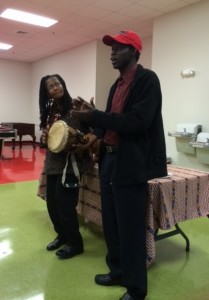
One of those eye opening moments was workshop facilitator’s Gwendolyn Napier’s segment “Putting the POP in Your Story”. Stories must have three essential ingredients: beginning, middle, and end. However, to make it POP other layers can be added. Using a food analogy, Gwendolyn explained that just as we layer a sandwich with vegetables, cheese, mayo, mustard, etc. The same can be done with stories. Layers of a story may include but are not limited to: rhythm, rhyme, music, call & response, props, or songs. To illustrate this layering, Gwendolyn Napier played the Djembe drum as Abrahim sung a Sudanese story song, ‘Those who sing praise in the name of the Lord’.
In the last segment of the workshop, “Making Stories Come to Life”, personal stories were featured, specifically stories about the day you were born. Our facilitator Janice Butt had participants share their stories which garnered some interesting tales. For example, Emmanuel told us he was born in a very small village in Sudan but did not know the date or time. However, when he came to this country he was given the bicentennial year of 1976 as his date of birth. So for him every day is his birthday.
Deborah Strahorn also had an interesting story about the day her daughter Ivy was born. She recalled being sick many times and asked for an epidermal to help. And sure enough, it worked! Or as Deborah put it, “I came in with a fat tummy and came out with fat arms.” And most import to note from this workshop segment is that we should always get permission before sharing someone’s personal story.
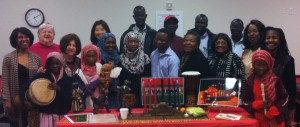
In summary, the workshop provided a solid foundation to assist with telling, gathering, personalizing, and adding a bit of flavor to your stories. It also included a wonderful Kwanzaa presentation by Laverne Amponsah where guests were given gifts (zowadi) as tokens of their appreciation and participation.
Chetter Galloway – Kuumba Treasurer (2012 – 2013)
